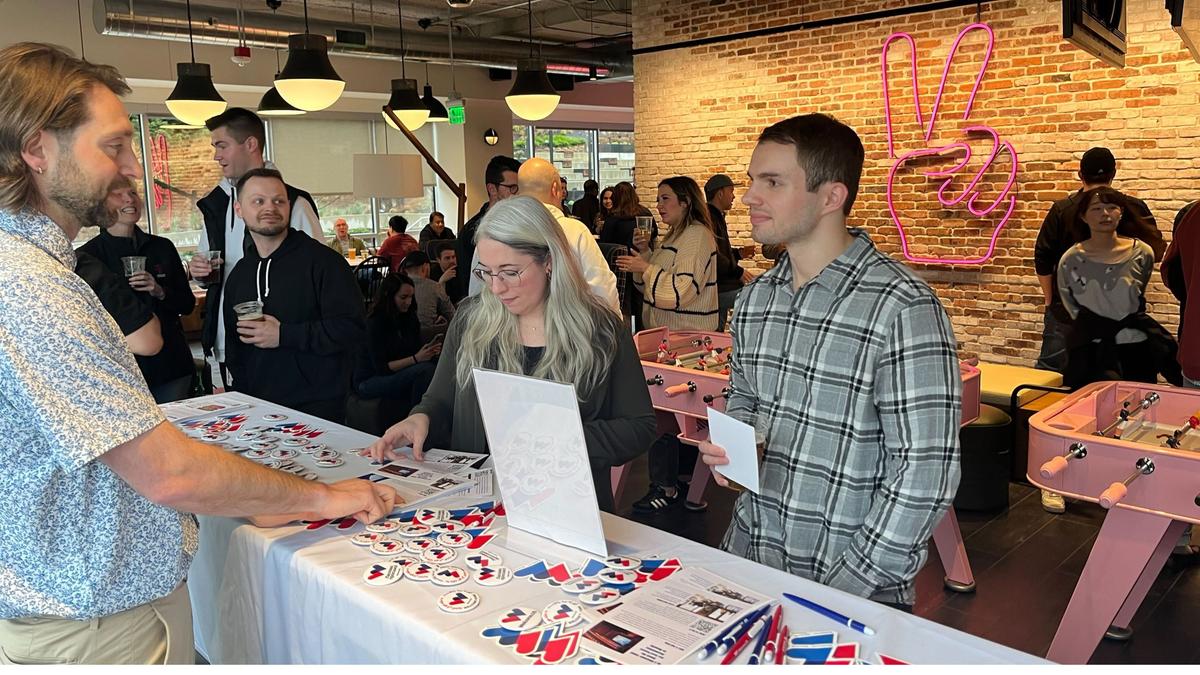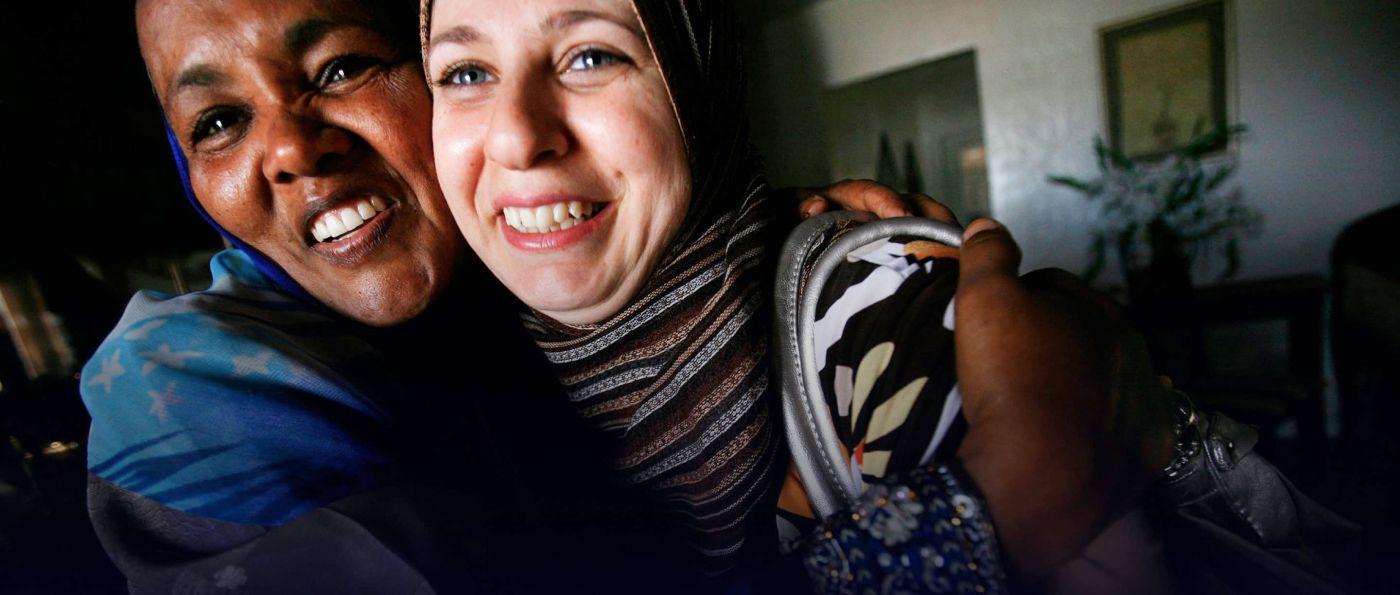

A Q&A with Jessica Bueler of Welcome Neighbor STL
Welcome Neighbor STL started in the fall of 2016 with a simple toiletry drive for newly arrived refugee families. Today, they are a multifaceted organization, serving hundreds of refugees representing 11 countries. Welcome Neighbor STL, a Welcome.US partner and previous Welcome Fund grantee, partners with community organizations to support refugee and immigrant families through opportunities that help them rebuild their lives in St. Louis, Missouri. Executive Director Jessica Bueler recently chatted with Welcome.US about Welcome Neighbor SLT’s latest work.
Over nearly a decade, Welcome Neighbor STL has fostered strong connections between refugees, immigrants, and the St. Louis community. Can you share more about the organization’s mission and how it has evolved to meet the changing needs of those you serve?
Welcome Neighbor STL's mission is to help newly arrived refugees and immigrants live their best lives in St. Louis. One of the things that I'm proud of with Welcome Neighbor is our ability to pivot as needs change for refugee communities in the area. So, we are not rigid in our approach. We don't have a cookie-cutter approach to treating our refugee families because we know that every family is individualized. We want to dig down to understand what drives them and how we can help them in a way that they want to be assisted.

When new groups of people come in, we listen to those refugee groups to learn what they need from us and how we can best respond to them. Our mission is to help them live their best life here in St. Louis, but we must also understand that we're in a constantly changing environment. So, we keep our ears to the ground and listen to see how we can best serve them.
There are many challenges that refugees face while rebuilding their lives in a new country. What are the most pressing issues for the families you support today, and how does Welcome Neighbor STL help address them?
When listening to our communities, we need to find out what they do and what we can do to help them best. What we've been focusing on right now is our culinary Supper Club program, where we have been helping Afghan and Syrian women earn their ServSafe Certification. For over 120 women, we've been able to translate those documents into their native languages and help them earn their ServSafe cooking license, which opens up a tremendous number of opportunities in the restaurant and catering industries. We provide the opportunity to get these licenses, instantly gain meaningful employment, and earn an income for their families.


A lot of times, we hear this narrative that when refugees come to the United States they're taking from our tax base. We're here to show people that's not the case, and flip the narrative over to show people that the foreign-born population is likely to start their own businesses here and contribute to the economy.
St. Louis has been losing population for the last 100 years. By systematically creating intentional programs, we begin to rebuild the population of St. Louis through new arrivals. This way, we can increase services and the tax base to revitalize a declining population.
This revitalization is something that economic leaders and political leaders in St. Louis are all on board for. The real challenge is navigating and creating this structure in a constantly changing political climate.
Refugees and immigrants have historically played a role in revitalizing American cities by opening businesses, filling workforce gaps, and increasing demand for housing. What trends have you seen in St. Louis that reflect this pattern?
Welcome Neighbor has been at the forefront of policy change in St. Louis, and we are currently working with legislative leaders to change the housing ordinance. The current occupancy ordinance requires only two people per bedroom. We are using other major cities in the United States, such as Chicago and New York, as a model to modify the occupancy to a two-plus-one model. We have had meetings for the past year with legislative leaders in the city of St. Louis about how to do this intentionally to rebuild the population of the city of St. Louis.
There are a lot of properties in the inner city that are deteriorating. One way we could promote economic development within the city is in collaboration with some of these larger families from Syria and Afghanistan. Many of these homes in downtown St. Louis are huge with four, five, or six bedrooms. By adding one additional person into a five-bedroom home, this would allow the family to be able to buy a home and start investing in the city of St. Louis.
We are proud to be at the forefront of proposing this legislation. We went to the Office of New Americans to discuss how this idea might help the entire city of St. Louis, and now this legislation will be presented in front of the city to look at how it could be modified this summer or this fall. This change in the housing ordinance is a surefire economic way to rebuild the inner city of St. Louis and also provide a resource for these immigrant families.
Programs like the Supper Club you mentioned provide economic opportunities while fostering cross-cultural connections. How has this and other workforce or entrepreneurship initiatives helped refugees build stability and deepen ties within the community?


Our culinary program is by far our most successful entrepreneurial program for newly arriving women from other countries, many of whom had never worked in their countries… We kept noticing that every time we visited these women, they would provide amazing food spreads, and the hospitality was incredible. With this, we started talking about what it would look like if we could share that with other people.
I started thinking about the concept of a Supper Club. It began with a Syrian woman who would make food from her country, and we could hold the event at somebody's home. So, for the first event, we used my backyard. It was a public event, and we had 14 people attend that first event. We had a Syrian woman bring all this food from her country and talk about her struggles, journey, and what she had gone through to get to the United States.
And at the end of it, a woman came up to me and said, “This was incredible. I have a birthday in two weeks and want this to be my birthday party. Can we have these women come and make food? I'll invite all my friends, and we'll do this for my birthday.”
For each of these events, we tell people at the end, if you liked this, you could have one of those at your home, your place of worship, your book club, your birthday party, or your wedding, and it just kept expanding from there. Since that first event, we have hosted 335 Supper Clubs and raised over $700,000 that goes back to the refugee chefs and our organization. This program has given refugee women the confidence to make a meaningful income for their families. It helps them avoid social isolation by making friends in their community, and it helps them practice English.

When these Supper Clubs began, we started hearing people ask why our programs focused on helping refugees and not other vulnerable populations like the homeless, so we thought, why not do both? We then started a program every Friday where our refugee women cook meals for unhoused individuals at two different shelters. We created a win-win-win dynamic, where these women get to give back and help other vulnerable populations.
How do initiatives like the Family Partner Program create meaningful relationships between refugees and longtime residents, and what impact have you seen from these efforts?
Our family partnering program is unique. We do this by asking for a one-year commitment from our volunteers. And, again, there's no cookie-cutter approach to this. We want to find out from the volunteers where they live to ensure close proximity to the family, what skills this person has that they want to share, and what they want to get out of this partnership.
It's essential to find that information before matching them with a family. We also talk with the refugee family to find out their goals, aspirations, and what they want to accomplish. Then, we help match a pre-created team or a team we put together to walk alongside the refugee family for one year. These are newly arriving families, and we help them adjust to their new community. This could include reading mail and scheduling doctor's appointments, navigating the school system, and helping them with any kind of documentation that they need.

When volunteers come to us, they say I want to do this to help out, or someone has volunteer hours they need to complete. But by the time the whole year is over, nobody's even worried about counting hours anymore because now they have become friends, and many of the pairings have become lifelong friends.
Our main goal is to help these families become self-sufficient and to help them truly find their place in their community. So, when they have a group of volunteers that wrap around them and help them walk through life together in their first year here in the United States, it helps the refugee families feel supported and truly welcomed, wanted, and included here in St. Louis.
How can Welcomers support your work at Welcome Neighbor STL?
We're really focusing on sharing two concepts with people: signing up to be a family partner on our website and sharing how community groups can make any effort, no matter how big or small, [to fundraise] on behalf of Welcome Neighbor. For example, right now, we have an incredible woman who's an artist, Diane Lamboli. She's doing an art show for a month, and she's donated 50% of all proceeds from her art to Welcome Neighbor for this month.


I really want to focus on these community events because I think people feel like hosting a fundraiser could be overwhelming, but you'll be amazed at how much a small event can raise and make a difference.
We only have two full-time staff members; everyone else is part time, which means we have a limited number of hours to provide services and fundraising. But if we can share our work with our community and let them know how they can help refugee families by becoming a family partner or doing a small fundraising event with a community group, we might get somewhere. Any effort, whether big or small, on behalf of Welcome Neighbor helps.
More stories of welcome





